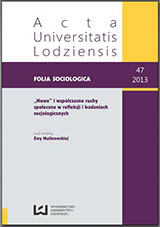STARE I NOWE OBLICZE NACJONALIZMU. WNIOSKI Z BADAŃ NAD BASKIJSKIM RUCHEM NACJONALISTYCZNYM
OLD AND NEW NATIONALISM. CONCLUSIONS OF THE STUDY OF BASQUE NATIONALISM
Author(s): Joanna Orzechowska-WacławskaSubject(s): Social Sciences
Published by: Wydawnictwo Uniwersytetu Łódzkiego
Keywords: nationalism; Basque Country; globalization
Summary/Abstract: The article addresses the problem of modern nationalism and its place among to- day’s social movements. Emphasizing the relevance of nationalist creed and the presence of nation- alism in the modern world, I focus on its special characteristic, i.e. a certain continuity of nationalist tradition and simultaneous dissimilarity between the two types, or better yet: two versions of nation- alism: the contemporary (“new”) one, and the classic (“old”) nineteenth-century one. In the part that is devoted to the analysis of empirical data, I analyze an example of modern Basque nationalism, which not only remains one of the principle forces that shape present Basque social space, but which is also a very good exemplification of this particular nature of nationalism, i.e. the link that national- ism draws between the past and the present. On one hand, nationalism is “new”, because the new are social, economic and political conditions in which nationalism operates (it is particularly visible in relation to the goals of nationalism), on the other hand it remains true to its origins – the core nation- alist values stay unchanged in a sense that both “old” and “new” nationalisms are based on the belief that the Basques are in fact a nation and as such they should have the right to preserve their national culture and language, and have the power to determine their own political destiny.
Journal: Acta Universitatis Lodziensis. Folia Sociologica
- Issue Year: 2013
- Issue No: 47
- Page Range: 73-86
- Page Count: 14
- Language: Polish

